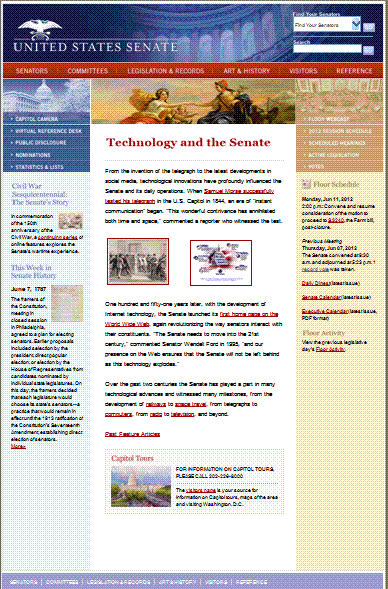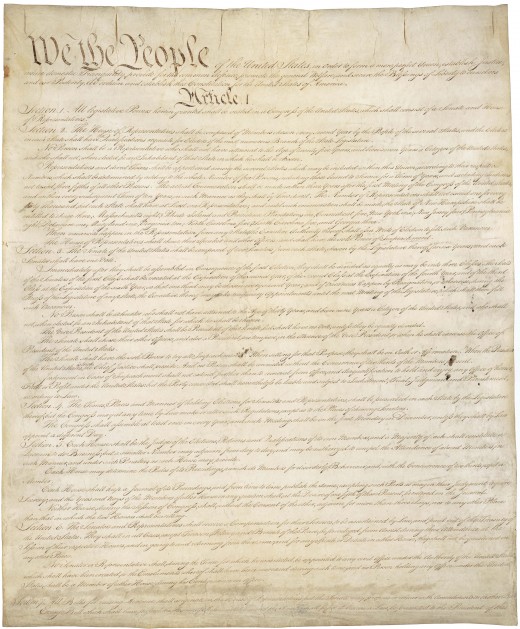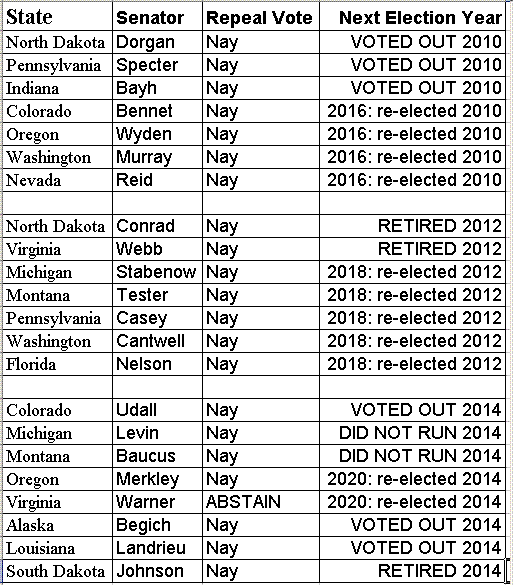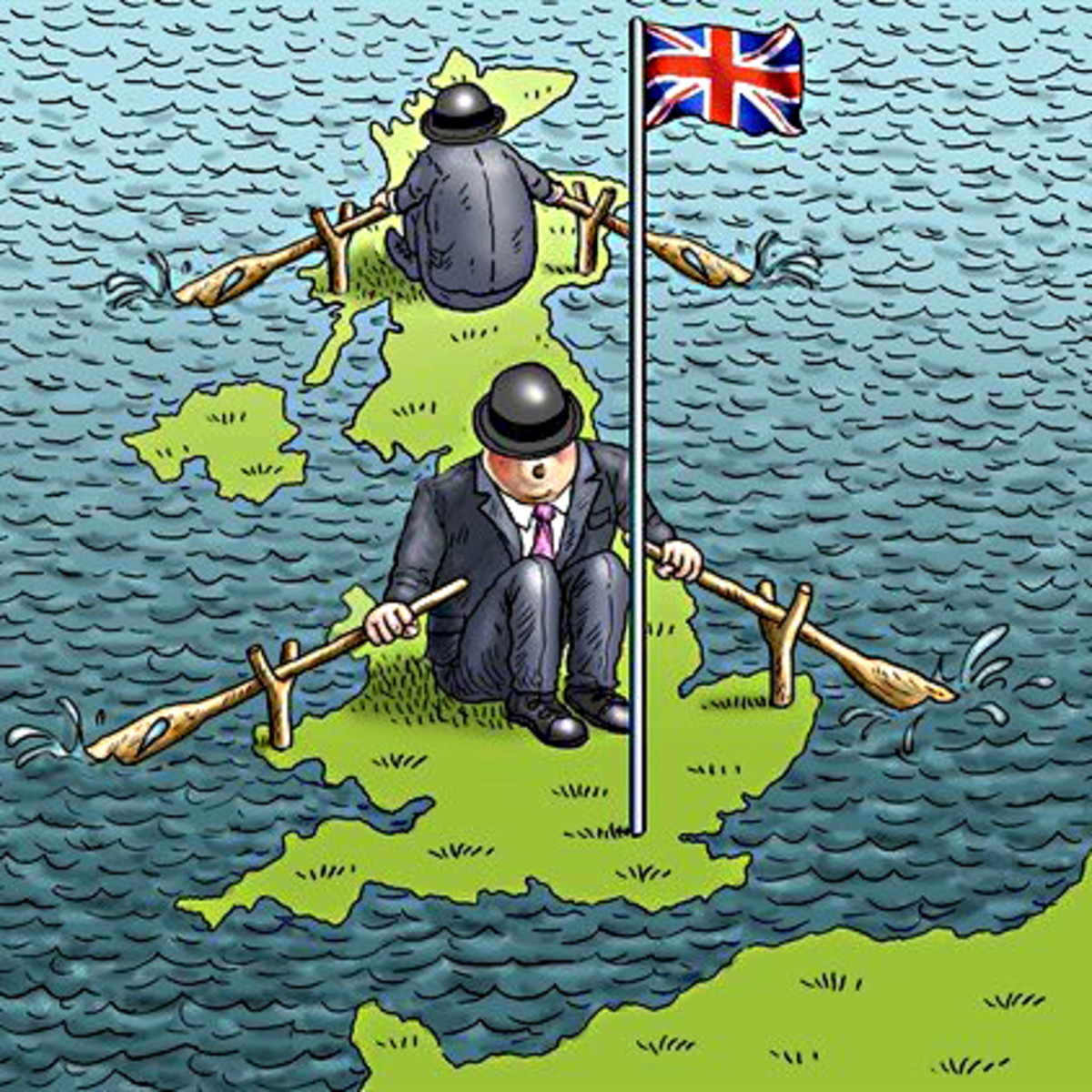Time for Change - Oust Partisan Senators
The Senate OnLine

NOTE: This article was updated 8 November 2012 to reflect the results of the 2012 Elections, and was also updated 7 December 2014 to reflect the results of the 2014 Elections. See the updated table and the section titled 'Reality Check' at the end.
A prior article written by this author discussed a number of options considered with respect to trying to correct the situation that led to the Health Care Bill being passed. That article argued for a repeal of the 17Th amendment, in favor of other options such as ‘leaving things as they are’, and ‘creating a new States Repeal amendment’. What was not discussed in the article, and totally overlooked by those who commented on the article, was the power that could be exercised by ‘We the People’.
Many of our politicians have loudly subscribed to bi-partisan efforts, and many of our newscasters have loudly supported that position. Even while doing so, those same politicians and newscasters have also loudly argued that the other side was responsible for the continuing partisan behavior. For the most part, it seems fair to say that we all agree that partisan politics needs to go. Yet realistically, we fully expect that the partisans will never be the ones who will make it so. This article reminds folks that we still have the power of the vote, and reminds folks that we can use that vote to hold our politicians accountable for non-representative partisan politics.
In that same prior article, the analysis focused on the Health Care Bill, the Bill that caused so much discontent across the country. The article compared a list of States that sued against Health Care to a list of Senators who voted FOR Health Care. From this we identified states where the Senators vote was in direct conflict with their states legislature, but whose vote supported their party position. Those states are: Colorado, Michigan, Montana, North Dakota, Oregon, Pennsylvania, Virginia, Washington, Alaska, Florida, Indiana, Louisiana, Nevada, and South Dakota.
In that article, the pattern of voting was attributed to these Senators holding allegiance and loyalty to their Party over allegiance and loyalty to their State.
Constitution - Ordained by 'We The People'

Open Government lets you Remember how they Voted
Senate elections come every six years for each Senator, with roughly one-third of the Senate eligible for replacement every two years. Because of that, remembering who did what with respect to Health Care (or other partisan actions) becomes an exercise in commitment for the people. In this case, the commitment needs to be to helping to undo a partisan system and focus on efforts to return to a system where partisanship is appropriately balanced against the other interests of our country and government. Partisan representation can be tolerated in the House, we can vote them out every two years if we don't like how they are voting. Partisan representation should not be tolerated in the Senate if it means our States are not represented
The 2012 elections provided an opportunity for ‘We the People’ to step in and do their part to help undo partisan politics, and to undo Health Care. We would be doing our part to help restore the balance of power in our federal government system, in this case, to help restore representation to our individual States, who were not faithfully represented by their Senators. It is my opinion that United States citizens are tired of the seemingly bipolar government that only makes our federal government bigger. This endless partisanship comes with a burden, a tax burden that is being paid by our taxpayers, and a burden that will be paid by our tax-paying children.
The issues we are facing today are much greater than any one issue. It is about how we allow ourselves to be governed, and about helping to restore the balance to our governance system. Proper representation for our States is one of the fundamental principals established by our forefathers when they wrote the Constitution. It was unforeseeable at that time that this principal would be undone by passage of the 17Th amendment. The 17Th amendment has not yet been repealed. In the meantime, citizens of the United States can remind our politicians that we recognize that proper representation of our States is essential to maintaining the balances of power in our government. We can do so by voting out those who choose to represent for their Party.
The table below shows Senators who voted for Health Care in 2010. The list is limited to those whose States sued to overturn Health Care at the federal level. It also shows their votes on a motion to Repeal Health Care February 2, 2011. Both votes strictly followed partisan lines, with one exception - Senator Warner of Virginia chose to abstain on the repeal Vote. You can review these voting records at http://www.senate.gov/. The ‘Votes’ tab is on the right-hand side. From there you can select ‘Roll Call tables’ for any Senate session. The roll calls of interest are “2010 (111Th, 2Nd) – Vote 00105” and “2011 (112Th, 1St) – Vote 00009”
On June 28, 2012 the Supreme Court ruled that the key 'individual mandate' of the law was Constitutional. In rendering their opinions, neither side noted the fact that a majority of States were suing to overturn the law, nor did they note that 14 of the States involved in the lawsuit were misrepresented by their Senators. This fact has largely gone unnoticed and not reported in the general media. The implication is that the general media tolerates partisanship, while at the same time voicing opinions against partisanship.

First - Let our Votes be heard!
The next Senate elections (in 2014 and 2016) provide the opportunity for citizens of the United States to help our politicians in their efforts to become non-partisan, by voting out elected officials who clearly hold allegiance to party above allegiance to representation for their States legislatures. In the case of many of the Senators who voted for Health Care, their allegiance is clear. We can help change this behavior by voting them out. This type of vote would also serve notice on our elected officials that we’d like to see some sort of balance of power restored to the States, and taken away from the Parties. They can talk about getting rid of partisanship all they want, but it won’t change until we start voting them out when their actions clearly are Partisan. Their actions speak louder than words, and so can ours. Exercise our power of The Vote!
Next - Support Repeal of the 17th Amendment
This process will be slower, but, an effort must be made to provide for proper representation of the States within our federal government. We need to restore overall balance of power between what States can afford and what People want. We need to restore the voice of our States legislatures within the overall federal law-making process, and replace the current partisan voices. We need a change that provides this balance as early in the law-making process as possible. Representation early avoids the economically damaging and time consuming process associated with going through an appeal to the Supreme Court. Representation during the law-making process, rather than through the appeal process, is consistent with the governance system that our forefathers put into place. It is also less costly, less time consuming, and less chaotic to our citizens.
As it is, government has two powers that are represented, the Democratic and Republican parties. State representation falls into the 'What are you gonna do about it?' category. The only path States currently have is to band together and appeal through the Supreme Court. This does not work if the Supreme Court is also beholden to one party or the other. This is unsatisfactory and needs to be changed.
Links and References
- The Green Papers: United States Midterm Election 2014
The Green Papers: 2014 Midterm Election. Facts, figures, and tidbits about the General Election, Primaries, Caucuses, Delegate selection plan, State and National Political Conventions, and Candidates. - Repeal_the_17th_Amendment : Repeal the 17th Amendment!
Many thanks go to the “Yahoo! Group – Repeal the 17th Amendment” for their discussions. They have influenced the author’s understanding beyond the simple ‘this isn’t right’ gut feel about how things are being done by our current elected officials. - Should We Anticipate Revolution By Treaty?
This article discusses concerns that US law might be superseded through treaty with the United Nations. There is a possibility that a group controlling the Senate and Presidency and the Supreme Court can make that happen.
Reality Check
Fact Number 1
On June 28, 2012, the Supreme Court of the United States upheld the Affordable Health Care law.
Fact Number 2 (7 December 2014)
In the elections following passage of the Health Care Bill, there were seventeen (17) Senators up for election who had voted for health-care then had their state join the lawsuit against it. Eleven (11) were re-elected by the people of their States and six were voted out. Five chose not to run for re-election.
Fact Number 3 (7 December 2014)
One of those who chose not to run for re-election is preparing to run for President in 2016. Will he argue against partisan politics?
If we regard how our voters vote as the sole evidence, then two things seem apparent:
- the people approve of the new Health Care law of 2010, and
- the people prefer Partisan representation over States representation.
Yet still, I humbly disagree, and will continue to argue for changes that may help undo the mess of Partisan politics.






